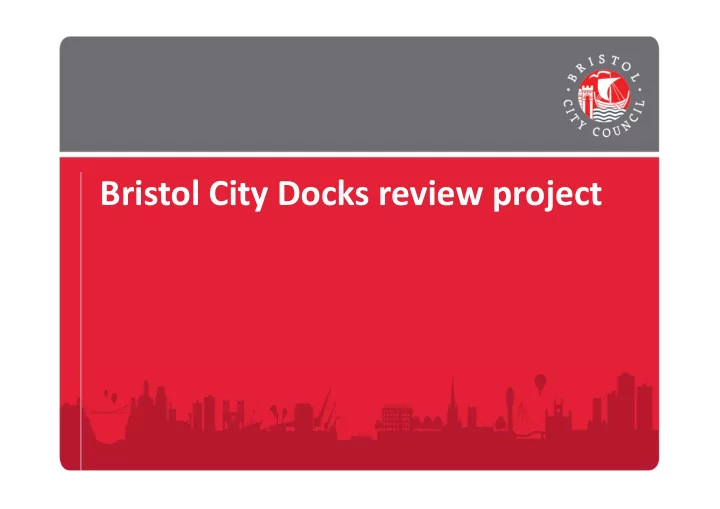

BUSINESS CHANGE Title Bristol City Docks review project
Vision • We want Bristol City Docks to be… – A commercial success – Safe and welcoming for all – A place for innovation and creativity – A world class tourist destination • We are undertaking a review on how the docks operate to make improvements that will contribute to the city aspirations for the whole harbour area.
Bristol City Docks Bristol City Docks is a “Competent Harbour Authority” which is • owned by Central Government (under the Department for Transport) and managed by the Local Authority - therefore classed as a “Municipal Port”. The Primary Legislation for running a port is contained within the • Harbour, Docks and Piers Act 1847. This act gives powers to the harbour authority to manage and improve facilities and – bylaws, and the power to charge for services. It also sets out statutory rights about what “a harbour authority has to do”, to include – conservancy duties, pilotage duties and rights to navigation. The City Docks also has a “designation” as a “right to navigation” • which states we have to allow free passage of vessels through our water. Other relevant legislation includes Bristol Dock Acts, Corporation • Acts and Harbour Revision Orders 1848-1997, and the local byelaws which were last updated in 2009.
Trust Port status • Bristol City Council have received requests a number of times from the DfT for an update on the progress towards being moved to a “Trust Port” status. • The move in this direction recognises that Trust Ports have better financial performance than LA managed ports and is something that is an aspiration of the DfT. • At present this would not be possible as the operation of the port is not cost neutral.
Information about the docks • Bristol is primarily a “leisure harbour” • There are 280 leisure licences that have been issued, these are renewed annually. • There are 22 commercial and residential leases (Commercial = restaurants, bars, a hostel). • There are lots of other organisations that also use the docks – VCS, not for profit, clubs, groups and commercial organisations. • There is a pricing structure in place for the chargeable usage/services within the docks.
Examples of organisations who use the docks VCS groups, charities and eductation: • – All Aboard, Scouts, Sea Scouts, Disability Charities, Schools, Colleges, Universities, Young Bristol, Adventurous Activities, Pride of Bristol Association, Matthew Trust. Clubs and societies • – Bristol Canoe Club, Bristol Rowing Club, Baltic Wharf Sailing Club, Bristol Gig Club, Clevedon Gig Club, Clifton Gig Club, Bristol Social Rowing Club, Bristol Canoe Polo Club, Sea Cadets. Commercial organisations • – Bristol Ferry Boat Company, No7 Ferries, Bristol Packet Trips, Bristol Stand Up Paddleboard Company, Blueprint water safety, Bristol Maritime Academy (RYA Training) SW Maritime Academy RYA Training, Motive Marine, Bristol Marina, Underfall Yard, Pooles Wharf Marina, Beese’s Tea Garden ferry, Channel Yacht Sales.
Fees and charges • See attached spreadsheet for an overview of the fees and charges related to the docks. • Where possible, these have been benchmarked to other docks / ports / harbours. • The initial work shows that Bristol is considerably cheaper than many other areas. • In order to become cost-neutral to the city, the pricing structure would have to change.
Proposed areas to review Workstream Detail Public engagement / consultation Fees and charges Complete benchmarking and Who: Targeted group of harbour/docks users Objective – to ensure the income propose updated fees and e.g. ferries, leisure boats etc covers the cost of running the charges. How: Engagement at Harbourside forum and harbour including repairs and Consider whether any activities recreational users group. maintenance. should use tender process. Consultation survey and feedback. Explore other income opportunities Policy and engagement Review byelaws and consider Who: Wider group of harbour users and Objective: to ensure the policies any updates businesses and laws are in place and are How: working group, via forums, use the correctly applied to ensure survey? effective operation of the docks. Harbour operating model and Alignment with harbour assets Who: Harbour users, businesses and other business plan projects Bristol residents Objective: to articulate strategic Agree and implement operating How: forums, use survey?, feedback, public direction and alignment to City model and business plan that engagement? aspirations complements city initiatives Service transformation Internal staff teams Who: internal staff teams Objective: to deliver out comes of How: internal comms channels the review.
Timescales • December 2018 – complete benchmarking and background work. • January 2019 – develop options for engagement and consultation. • Feb – Apr 2019 – engagement and consultation • May/Jun 2019 – cabinet report for decisions and investment • From Jun 2019 - implementation
Recommend
More recommend